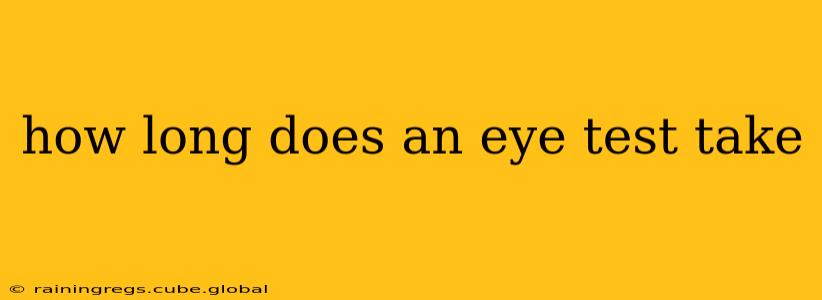How Long Does an Eye Test Take?
The length of an eye exam varies depending on several factors, but generally, you should expect to spend anywhere from 30 minutes to an hour at the optometrist's office. However, some appointments might be shorter or longer. Let's explore the factors that influence the duration.
What Factors Influence the Length of an Eye Exam?
Several factors contribute to the overall time spent during an eye examination:
-
The complexity of your needs: A routine eye exam for a healthy adult with no significant vision problems will typically be quicker than an exam for someone with pre-existing conditions, like glaucoma, macular degeneration, or diabetes. These conditions necessitate more thorough testing.
-
The type of exam: A basic vision screening to check your refractive error (nearsightedness, farsightedness, astigmatism) will be shorter than a comprehensive eye exam, which includes assessments for eye diseases and overall eye health. A comprehensive exam often includes more advanced tests and procedures.
-
Your optometrist's schedule and approach: Optometrists have different schedules and approaches to patient care. Some may be more thorough or detail-oriented, leading to longer appointment times.
-
The need for additional tests: If the initial tests reveal any abnormalities, your optometrist might order additional tests, such as visual field testing, OCT scans, or retinal photography. This will naturally extend the appointment duration.
What Happens During a Typical Eye Exam?
A standard eye exam typically involves these steps:
- Vision acuity test: This measures how clearly you see at various distances using an eye chart.
- Refraction test: This determines your refractive error to prescribe corrective lenses (glasses or contact lenses).
- Eye muscle test: This assesses the alignment and coordination of your eye muscles.
- Intraocular pressure test (tonometry): This checks for glaucoma by measuring the pressure inside your eye. (Not always included in a basic exam).
- Examination of the eye structures: This involves using specialized instruments to inspect the internal structures of your eyes, such as the retina and optic nerve. This helps detect potential diseases.
How Can I Prepare for My Eye Exam?
Being prepared can help streamline the process and make your appointment more efficient. Here are a few tips:
- Bring your current eyeglass or contact lens prescription: Having this information readily available saves time.
- Update your medical history: Be prepared to discuss any relevant medical conditions or medications you're taking.
- Bring a list of questions: Write down any questions you have about your vision or eye health beforehand.
- Arrive on time: Punctuality ensures you get the full attention of your optometrist.
What if My Eye Exam Takes Longer Than Expected?
If your eye exam takes longer than you anticipated, it's usually because your optometrist is taking the time to perform a thorough examination or has discovered something requiring further investigation. This is a good thing! Early detection of eye problems is crucial for preventing vision loss.
Is there a minimum length for an eye exam?
While there isn't a strictly defined minimum length, a very short exam might indicate a less thorough assessment. A comprehensive exam, especially for adults, will typically take at least 30 minutes to properly assess your visual acuity and eye health.
In conclusion, while a typical eye exam might last between 30 minutes and an hour, several factors can influence the duration. The key is to ensure you're seeing a qualified optometrist who takes the time to provide a thorough and comprehensive evaluation of your eye health.
